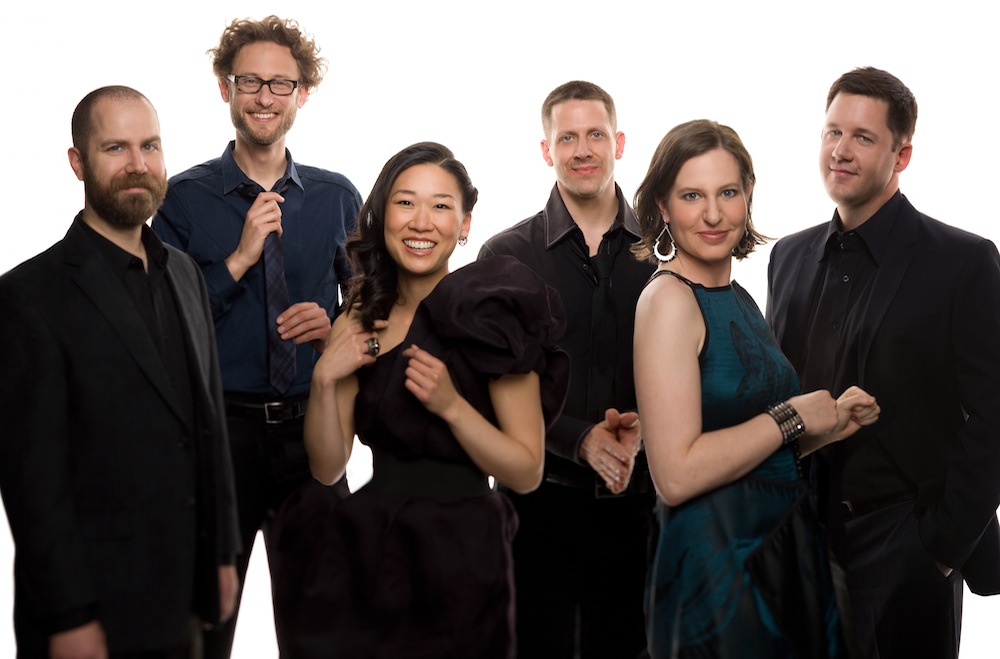With high ambition, eighth blackbird swoops too low in Miller Theatre opening
They can’t all be great, and even as consistently fine a performance series as that of Miller Theatre can have an off night.
Miller director Melissa Smey presents such a broad and consistently excellent range of music that a disappointing concert leaves a sharper pang, especially when it comes, like this one, on opening night.
On Thursday, the Chicago chamber ensemble eighth blackbird brought a program that combined new and early music with the staged theatricality that is one of their trademarks. An ambitious concert all around, in concept everything might have worked, but in practice the evening was undermined by what Karl Marx liked to call “internal contradictions.”
The idea of “Heart & Breath,” the title of the performance, was to create drama through old and new music. That meant a series of short pieces in the first half, played as a medley, and a complex theater piece that matched new music and ancient dramatic ideas.
The opening piece, Duo for Heart and Breath, was played by Yvonne Lam on the viola and Lisa Kaplan at the piano. The work is based around the expressive concept of the pianist playing to a tempo set (and varied) by her heartbeat, while the violist plays tones to the length of her breathing.
This is an effective if modest idea, but the piece, composed by Arcade Fire member Richard Reed Perry, doesn’t have enough music to be exploited. Opening a set that continued with arrangements by eighth blackbird flutist Tim Munro of madrigals from Monteverdi and Gesualdo—”Lamento dell ninfa” and “Moro, lasso al mio duolo” respectively—and closing with another composition from a pop musician (Bon Iver’s “Babys,” arranged by Kaplan), it suffered woefully in contrast to the ancient music.
This wasn’t so much contradictions between peers but an unfair fight between two great composers and two people who can’t compose above a rudimentary level. Monteverdi’s and Gesualdo’s madrigals are deep and intense, expressing uncanny human emotions with formal skill and sonic beauty. Munro’s arrangements were superb, true to the nature of each piece while still transforming them with impressive imagination. For Monteverdi, he set a foundation of regular rhythm via stopped piano strings, and that set the freedom of the polyphony in relief, while with Gesualdo’s music he took care to preserve the harmonic motion while turning the overall idea towards abstraction.
Meanwhile, Perry and Iver set about repeating simplistic chords in sequences that weakened the harmonic rhythm, and produced nothing that came anywhere near to a melody. (Kaplan’s arrangement was straight.) They also showed no understanding of form or structure. They have received praise as songwriters but their pieces struggled to be any kind of song.
Putting pop music thinking, and new pieces from pop musicians, into contemporary classical music has now become commonplace, so it’s time for ensembles like eighth blackbird to think long and hard about who they want to have write such music for them. Playing in a band and listening to some Steve Reich doesn’t make one a composer—writing music with some modicum of form and structure does.
In the second half, the music was from Amy Beth Kirsten, and it was strong. Her writing has tremendous precision, and she is a fine orchestrator. The music is abstract, yet has the structure to hold it together and the form to give it direction.
The problem with the performance of this piece, Columbine’s Paradise Theatre, was the staging. Kirstein proclaims herself a lover of commedia dell’arte, and the musicians served two roles: playing and acting as the stock commedia characters. Yet what happened on stage was too often obscure, and highly mannered, going on far too long and detracting from the music.
Kaplan was Columbine, and everything revolved around her, musically and stage-wise, as the opaque staging implied that what the audience saw was something out of her fantasies. Nicholas Photinos was largely static as cellist and The Harbinger, Harlequin was the trio of Munro, Lam and clarinetist Michael Maccaferri, while Pierrot was played with a lonely, romantic sensibility by percussionist Matthew Duvall.
The characters don’t speak, although they sometimes sing text from 16th century poet Isabella Andreini, but they move in commedia style and we know them by their deeds. Unfortunately, the musicians didn’t have the stage presence or the fluid energy to carry the parts. And the parts themselves are a tough go, as commedia is specialized and takes substantial connoisseurship to understand, much less enjoy.
Duvall was the only one who pulled it off. He seemed to recognize his limits as a dramatic performer and worked within them, letting his playing speak for the character (there is a lovely moment when he takes the bass drum, lit up like the moon, and carries it down to the floor to play something of a love song on it).
Eighth blackbird is one of the better ensembles at staging their performances, but this show, directed by Mark DeChiazza, required that they act, and that miscalculation revealed the distance between performing musicians and actors.
Miller Theatre’s Composer Portrait series opens October 2 with music by Chou Wen-chung. Their early music series opens October 25, with Le Poème Harmonique. millertheatre.org.
